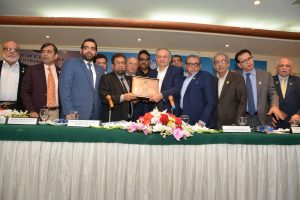KARACHI: Government of Pakistan will implement a comprehensive import tariff next year under the National Tariff Policy, which would be announced by June 2019, Advisor of Prime Minister on Commerce and Industry Abdul Razzak Dawood said.
“The National Tariff Policy would remain unchanged for atleast three years to build confidence of the industry,” advisor said.
Speaking at KCCI on Saturday, Advisor of Prime Minister on Commerce and Industry Abdul Razzak Dawood said the power of making the Customs tariff was being taken away from the Federal Board of Revenue (FBR). “The Ministry of Commerce has prepared the draft of the National Tariff Policy and anomalies in Customs import tariff are being rationalized.”

He informed that government was also preparing an Industrial Policy primarily aimed at export enhancement and import substitution.
“Incentives will be accorded to strategic industries, young and pioneer industry and value added export sector. However, there will be no incentives on the export of basic products such as yarn, as government intends to discourage export of basic goods.”
Talking about government’s performance in 100 days, the advisor said, “Initiation of FBR reforms is the most commendable this, the government has done in first 100 days”.
He said tax policy making and Customs tariff making powers were being taken from FBR, which would have far reaching effects.
Talking about his visit of Japan, Abdul Razzak Dawood informed that Pakistan would seek technology funds, SME development funds and also seek arrangement so that local workforce could be trained in Japan.
Earlier, President Karachi Chambers of Commerce and Industry (KCCI), Junaid Makda underlined the problems faced by the business community.
“Industry needed uninterrupted gas supply, lowered cost of utilities and support to value added export sector.”
President KCCI proposed that a focal person should be appointed at PM Secretariat to deal with the issues of export sector. “Monthly meetings should be held at PM Secretariat to discuss the issues and status of exports.”
Makda said that trade bodies’ budget recommendations were not being considered for the last two years and expressed hope, the proposals will be considered in the upcoming budget.
Former President KCCI Anjum Nisar said energy costs, borrowing costs and duty/taxes on imported inputs were hurting exports.
He said that Pakistani rupee had depreciated 33% since January 2018 posing a big blow to the country’s industry.
“Exports in four months clocked in at $7.3 billion, and if the trend continues, exports this year would be lower than last year”.
Chairman Business Men Group (BMG) Siraj Kassim Teli said the bureaucracy had been mis-leading the governments for the last 70 years. He maintained that bureaucracy had divided the country’s induatry into two i.e. export oriented industry and general industry.
“There is a discrimination in rates of utilities, import duties etc, for general and export oriented industry, which has created a sense of deprivation among industry.”
He said government must support both general and export oriented industry.
Teli said the Federation of Pakistan Chambers of Commerce and Industry (FPCCI) was encroaching the domain of KCCI and other trade bodies, and urged the advisor that the roles of trade bodies should be defined and streamlined.
